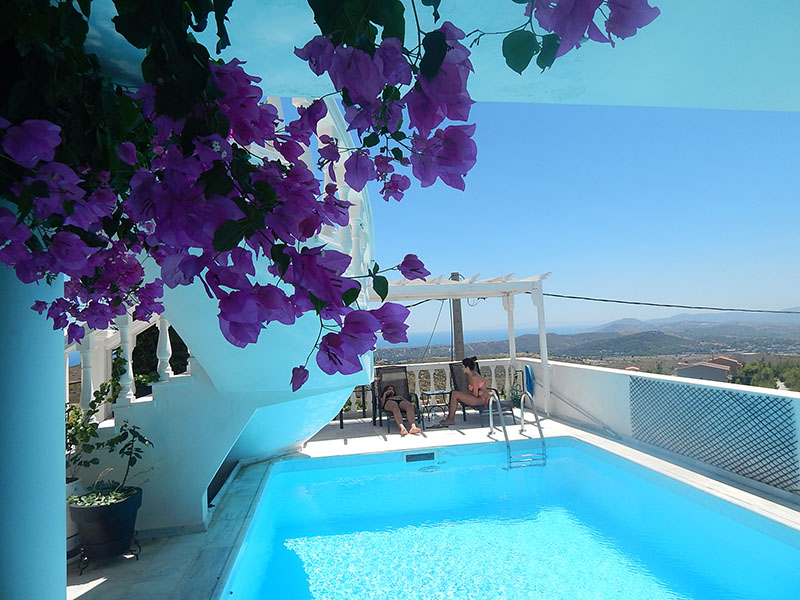Imagine for a moment that you are already active for the last two years in short-term rentals, for managing a villa with swimming pool; and that most of your reservations come from Homelidays, where you have the option of paying an annual subscription, and not the choice of paying a revenue share per booking.
So let’s assume that in the final booking prices, the gross turnover you had from the bookings at Homelidays for the last season was € 80,000. The amount you paid to Homelidays to get this turnover was € 2,400 credit card costs, and € 300 for annual subscription, a total of € 2,700.
So far, for 10 of your 12 bookings each season – according to Homelidays – you only paid € 300 subscription per year and 3% credit for card payment (transaction), for any reservation.
While the tenant paid 5-12% commission for the reservation he made – the final amount depends on factors such as the size of the reservation and the rental price for the villa.
So imagine now that Homelidays decides to abolish the annual subscription, and those owners who were subscribers would be automatically transferred to the new and only option of cooperating through revenue share. So from the point where you were paying only 3% for the booking transaction – and accordingly always with what Homelidays says – you will be transferred to another payment policy where for every booking you will pay 8% and the tenant will pay another 5-12%. In addition, if you are an individual owner you will have to pay the 8% and an additional 19% VAT, so your share of payment for the booking would be around 10%.
What will this do at € 80,000, which is your turnover from the reservations coming from Homelidays so far? It increases the amount you paid to Homelidays, and from € 2,700 the payment goes to € 8,000. That is what it does.
This is an imaginative scenario at present – that is, Homelidays still offers you to choose between two forms of payment as previously described – but I really think that this imaginative scenario is much closer to becoming real than ever-and I’m not the only one who believes this. Many people anticipate this change to happen.
The question is, what would you think if it happened to you? Wouldn’t you feel a little trapped and forced to agree to something you don’t really want? Wouldn’t you be on the lookout for alternatives? Wouldn’t you think that ‘some kind of exploitation is happening here’? Wouldn’t you be looking for ways to save yourself from such a thing, so that you have more control over what happens to your earnings?
Let’s go now to real stories.
In early 2018, TUI decided to increase its total supply from 15% to 18.6%.
The increase would be applied on April 1st.
What was worse was that any reservation for 2018, which had already been made before the increase on April 1st, would also get the increase, i.e. for a reservation made in November 2017, for holidays e.g. in July 2018, the commission was 15% when the reservation was made, but an adjustment would be made so that the reservation will be commissioned to 18.6% before the arrival of the tenants in the summer, with a charge of the remaining 75% paid by the tenant in the second installment ( there is a 25% down payment and the remaining 75% one month before the arrival).
In our previous example with Homelidays and the € 80,000 this is the equivalent of an additional € 2,600 in commissions. Without sitting down to look at the reasons for this increase, you get a little shock!
I won’t even discuss the commission raise from Airbnb from 10% to 16% in 2016.
I’m just showing examples of how vulnerable managers are when they are completely dependent on a rental platform.
Personally, I have no doubt that all these changes in booking commissions will reach 25% at some point in the future. There is already a platform that charges so much.
But in addition to commissions, there are other things that cause problems with platforms such as:
- Change the terms of cooperation every now and then with minimal notice
- Change the website menus
- Strict platform in-communication rules
- The effects on the administrator or owner in case of being misinformed
- Absolutely strict cancellation rules and limited options as regards bookings
- The incredibly competitive environment between properties on the same platform
- The embrace of the state for the purpose of further taxation and control
- Late payment, which is made almost entirely after the tenant arrives
- The double-edged sword of reviews that have a catalytic effect on your results
To all this we can add the limited possibility of communication and support with platforms that have no representation in Greece, which also has a cost if one thinks of long distance calls, as well as the long delay in settling questions if communication is limited only to email or chat. Especially during the summer.
If someone talks to tourism professionals who have been renting real estate for many years, he will find that most of their bookings come directly, bypassing the platforms. There are several alternatives from which one can withdraw reservations for a property.
For example, the hybrid alternative to platforms is to build a reputable website for your property.
This is a solution that, along with the platforms, can contribute seriously to your overall reservations.
Having a private website new doors open up and other alternatives. Digital advertising is one of them. The cost of digital advertising has fallen in the last two years. Even in the most famous digital advertising tools like Google Ads for example, it is possible to find a huge number of customers together with good demographics, and a cost per visitor to the site starting from about ten euro-pennies ( but competition rises) .
So at a cost of about the cost of purchasing a weekly booking from one of the platforms, it is possible to run a digital ad that will deliver in 2-3 months anything between 5-22 thousand visitors who have the appropriate demographic profile that matches the profile of those who book via platforms.
Even if one or two people book the property as a result of the advertisement, it is considered as a gain that will contribute to the overall mix of various booking sources for the property who originate outside platforms.
The same goes for social media digital advertising. Advertising on Facebook and Instagram is cheaper than Google.
There is also SEO, which can prove to be the best solution of all – when the property dominates the organic search results on Google , compared to competitors, it gets more bookings, simply because it gets all the traffic from visitors looking to use words related to this property or the location of the property.
There is also the posting of ads in foreign newspapers of a particular country, which will lead readers to the private website, for a minimal cost.
And to close, there are travel agencies.
Here you can download a list of the details of all travel agencies located in Switzerland.
To see or download the list click here.
The Swiss are considered by many to be the bon fillet of tourists. Imagine how much better it would be if a property manager cooperated with only a few of the agencies on this list. But it is not easy. In order for such a list to bear fruit and for new horizons to open up, one must also know how to manage it. You will definitely need a CRM tool. And it would be necessary to write a very professional letter that would lead to information about the property, photos, etc. The terms of cooperation with the agencies should be formulated (contract), booking commissions must be agreed, special price lists must be made with every travel agency etc.
So there is some work to be done; but it pays off.
And of course the agencies get commissions like the platforms. Sometimes, however, their commission goes above the final price, so the amount that will be paid to the administrator in these cases is equal to the final price on the platforms. Also, unlike platforms that love to send instant bookings, agencies ask first before commit the property to a booking. On the other hand, they also carefully choose the properties with which they will cooperate.
Finally, cancellations from travel agencies are much rarer, simply because cancellation policies always have monetary compensation.
And of course, agencies can contribute to the property’s overall reservations, along with all the other ways mentioned.
As you can see your options open further and go beyond platforms.
And here, of course, is the difference between amateur and professional management of a property: how many of you know how to successfully manage all the mentioned alternatives, so that you can become independent of platforms and have results with all the alternatives working together in harmony?
It is up to you to find an administrator who will run all the alternatives at the same time and bring you the best possible number of bookings in the season, limiting the need for “enslavement” on platforms.
So here we end. What I shared with you in this seminar is only 1% of what is available in information and experiences about short-term leases.
You can contact me directly through the site.
Konstantinos Papachatzis .

